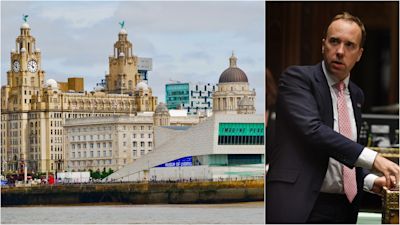Covid-19: Restrictions tightened in Liverpool, Warrington, Middlesbrough and Hartlepool

Video report by ITV News Reporter Ben Chapman
Household mixing will be banned in the Liverpool City Region, Warrington, Middlesbrough and Hartlepool from one minute past midnight on Saturday, as the government seeks to bring down coronavirus infection rates.
Matt Hancock said the government is recommending against all social mixing between separate households in any setting, but mixing indoors will be illegal and people who breach the law could be fined.
It means groups of six or less can still meet in outdoor public spaces like parks and outdoor hospitality but the government is recommending against it.
People are also advised to only travel for essential reasons such as work or education, avoid visiting care homes except in "exceptional circumstances" and avoid attending amateur or professional sports events as spectators.
The Prime Minister’s spokesman said the measures “mirror” those already announced for the North East of England and followed discussions with local leaders.
The spokesman added: “It was determined that this was the right package of measures in order to reduce the spread of the virus.”
Confused by the new restrictions? ITV News Political Reporter Shehab Khan explains below
Mr Hancock said £7 million will be provided to local authorities in these areas to "support them with their vital work".
The health secretary said the new rules were being imposed because cases in Teesside and the North West continue to "rise fast". He said the rules would be the same as those announced recently for the North East.
Largest Covid-19 study shows one in 200 people in England were infected
NHS staff on a Covid second wave: 'We are mentally prepared'
The new restrictions have been met with resistance by the Mayor of Middlesbrough Andy Preston, who said the government is “imposing restrictions that’ll kill viable jobs and damage mental health”.
In a video posted on his Twitter, Mr Preston said: “I think that this measure has been introduced based on factual inaccuracies and a monstrous lack of communication and ignorance.
“I don’t accept the statement at all, I don’t accept the measures, we need to talk to government, they need to understand our expertise to get things done and preserve jobs and wellbeing.”
Restrictions in Bolton will align with the rest of Greater Manchester, implying hospitality venues will be allowed to reopen.
There are no changes to measures in West Yorkshire, West Midlands, Leicester, Lancashire or the rest of Greater Manchester.
When the latest restrictions come into effect there will be more than 14 million people in the UK living under some form of increased lockdown - around a third of the population.
New restrictions are thought to be dangerously close for London - home for eight million people - with coronavirus rates there also rising, but ministers are especially keen to avoid imposing new measures in the capital.
Despite growing criticism of the 10pm curfew on hospitality venues in England, the government is sticking by the restriction, at least for the time being.
Mr Hancock was asked by Labour's shadow health secretary Jon Ashworth what he plans to do to avoid people "piling out" of pubs at the same time and causing crowds.
Mr Hancock said: "The scientific advice is that the people who are closer together are more likely to spread the virus, and later at night social distancing becomes harder.
"We've all seen the pictures of people leaving pubs at 10 o'clock but otherwise they would have been inside the establishments and we all know that outside is safer, or they'd be leaving later.
"Of course, we keep this under review and of course we're constantly looking at how we can improve these policies, but I think we've got to look at both sides of the evidence to try to get this right."
On Wednesday evening, in the 100th Downing Street Covid-19 press conference, England's Chief Medical Officer Chris Whitty said the virus spread is "accelerating quite rapidly" in areas such as North East and North West England.
He warned of a "long winter ahead", with coronavirus cases elsewhere across the UK experiencing a "significant rise".
But early results from the largest Covid-19 study in England suggest measures "were beginning to work", Mr Hancock said, with the growth of infection appearing to slow.
The director of the programme said it could mean efforts to control the virus could be working.
But Labour's Mr Ashworth questioned why areas with greater restrictions have not come out of local lockdowns.
Mr Ashworth told MPs: "Also, some of the heaviest increase in infections appear to be taking place in areas where restrictions are in place.
"So why are the interventions not working? Why are the moles not getting whacked?"
Eight patients die in Covid-19 outbreak at Royal Glamorgan Hospital
More than 170 people test positive for coronavirus at meat factory
Matt Hancock replied: "It is true that some parts of the country have come through a local lockdown.
"In fact, we've lifted many of the measures, for instance, that were in place in Leicester.
"We weren't able to lift all of the measures and the case rate there did go back up again, although it has now appears to have stabilised."
More than 80,000 volunteers were tested in England between September 18-26 as part of the country’s largest study into the virus.
Matt Hancock said the study showed "early signs" that the R number "might be falling".
Watch Matt Hancock's full address to the Commons: